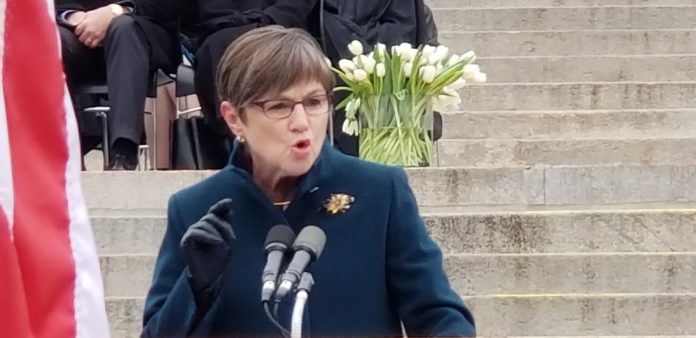Democratic Gov. Laura Kelly received a six percentage point bump in her approval rating for the second quarter, a new poll shows.
Morning Consult released it approval ratings for the nation’s governors late Wednesday night and Kelly had climbed to 49% at the end of the second quarter, a jump from 43% in the first quarter.
The Democratic governor’s disapproval number was at 22%, giving her a 27 percentage point margin over her unfavorables. Twenty-nine percent didn’t know.
By comparison, the average net approval rating in the survey for Democratic governors was 11 percentage points. For Republican governors, it was 28 points.
Just six months into her first term, Kelly enjoys one of the lowest disapproval ratings in the country.
Only eight governors – all Republicans – had a lower disapproval rating than Kelly, who was tied at 22% with Republican Indiana Gov. Eric Holcomb.
The latest survey was different from the one done in the first quarter when state Republicans criticized Kelly for her 43% rating.
The latest rankings are based on 487,624 surveys of registered voters nationwide conducted April 1 through June 30.
The poll, which surveyed 4,561 registered voters in Kansas, had a margin of error of plus or minus two percentage points in Kansas.
The top five most popular governors were (three tied for fifth):
- Republican Charlie Baker of Massachusetts (73%)
- Republican Larry Hogan of Maryland (70%)
- Republican Chris Sununu of New Hampshire (65%)
- Republican Phil Scott of Vermont (60%)
- Republican Doug Burgum of North Dakota (59%)
- Republican Mark Gordon of Wyoming (59%)
- Republican Asa Hutchinson of Arkansas (59%)
The governors with the lowest approval ratings:
- Republican Matt Bevin of Kentucky (32%)
- Democrat Ned Lamont of Connecticut (32%)
- Democrat Gina Raimondo of Rhode Island (38%)
- Democrat Kate Brown of Oregon (41%)
- Democrat Ralph Northam of Virginia (42%)
The poll comes after a session in which Kelly won passage of a school finance bill that ended nearly a decade-long legal battle to adequately fund schools
Kelly also turned back two attempts to return a so-called revenue windfall when the Legislature failed to muster enough votes to override vetoes on two separate bills..
She said the legislation was fiscally reckless and would return the state to the era of budget deficits under former Gov. Sam Brownback.
Supporters of the tax legislation said it would have only returned extra revenues the state expects to collect because of changes in the federal tax code.
The governor also won a battle to defeat a bill that would have required physicians to notify women that their chemically-induced abortions can be reversed. The Legislature also came up short in trying to overturn the governor’s veto of that bill.
Within 24 hours of taking office, Kelly also signed an executive order protecting lesbian, gay, bisexual and transgender state employees from discrimination.
However, Kelly failed to accomplish one of her chief objectives of expanding Medicaid when Senate leadership bottled up an expansion bill last session.
Throughout Kelly’s first term, the governor battled Senate President Susan Wagle on a number of issues, most notably over the governor’s appointment of Jeffry Jack to the Kansas Court of Appeals.
Jack’s nomination unraveled after a series of his angry – and sometimes profane tweets – directed toward conservative politicians were revealed.
Kelly backed off the nomination, but Wagle refused to move ahead with a new appointment contending that the governor had run out of time to make a new nomination.
Ultimately, the issue was decided by the state Supreme Court, which found that the Senate had to decide Jack’s nomination before the governor could make a new appointment.
The poll ended on June 30, just before the governor agreed to withdraw a plan to extend the timeline for providing food-assistance benefits to adults who aren’t working and who don’t have children.
The governor rescinded the administrative change after Attorney General Derek Schmidt threatened to challenge the legality of the policy change in court.
House Majority Leader Dan Hawkins first questioned whether the policy change was legal, ultimately leading to the attorney general getting involved and the governor withdrawing the policy.
Kelly cast Republicans who opposed the change as taking a “mean-spirited” position while the attorney general contended it was a “victory for the rule of law.”













